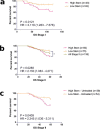The prognostic value of the stem-like group in colorectal cancer using a panel of immunohistochemistry markers
- PMID: 25906747
- PMCID: PMC4494972
- DOI: 10.18632/oncotarget.3497
The prognostic value of the stem-like group in colorectal cancer using a panel of immunohistochemistry markers
Abstract
Colorectal cancer (CRC) is the second leading cause of cancer-related deaths in the Western world. It is becoming increasingly clear that CRC is a diverse disease, as exemplified by the identification of subgroups of CRC tumours that are driven by distinct biology. Recently, a number of studies have begun to define panels of diagnostically relevant markers to align patients into individual subgroups in an attempt to give information on prognosis and treatment response. We examined the immunohistochemical expression profile of 18 markers, each representing a putative role in cancer development, in 493 primary colorectal carcinomas using tissue microarrays. Through unsupervised clustering in stage II cancers, we identified two cluster groups that are broadly defined by inflammatory or immune-related factors (CD3, CD8, COX-2 and FOXP3) and stem-like factors (CD44, LGR5, SOX2, OCT4). The expression of the stem-like group markers was associated with a significantly worse prognosis compared to cases with lower expression. In addition, patients classified in the stem-like subgroup displayed a trend towards a benefit from adjuvant treatment. The biologically relevant and poor prognostic stem-like group could also be identified in early stage I cancers, suggesting a potential opportunity for the identification of aggressive tumors at a very early stage of the disease.
Keywords: biomarkers; cancer stem-cell; carcinoma; colorectal; immunohistochemistry.
Conflict of interest statement
The authors declare that no potential conflict of interests exists.
Figures



Similar articles
-
The Prognostic Value of Cancer Stem Cell Markers (Notch1, ALDH1, and CD44) in Primary Colorectal Carcinoma.J Gastrointest Cancer. 2019 Dec;50(4):824-837. doi: 10.1007/s12029-018-0156-6. J Gastrointest Cancer. 2019. PMID: 30136202
-
Cancer Stemness, Immune Cells, and Epithelial-Mesenchymal Transition Cooperatively Predict Prognosis in Colorectal Carcinoma.Clin Colorectal Cancer. 2018 Sep;17(3):e579-e592. doi: 10.1016/j.clcc.2018.05.007. Epub 2018 May 26. Clin Colorectal Cancer. 2018. PMID: 29921496
-
The prognostic value of cancer stem-like cell markers SOX2 and CD133 in stage III colon cancer is modified by expression of the immune-related markers FoxP3, PD-L1 and CD3.Pathology. 2017 Dec;49(7):721-730. doi: 10.1016/j.pathol.2017.08.007. Epub 2017 Nov 6. Pathology. 2017. PMID: 29102042
-
Colorectal micropapillary carcinomas are associated with poor prognosis and enriched in markers of stem cells.Mod Pathol. 2013 Aug;26(8):1123-31. doi: 10.1038/modpathol.2012.163. Epub 2012 Oct 12. Mod Pathol. 2013. PMID: 23060121
-
Cell surface molecules and their prognostic values in assessing colorectal carcinomas.Ann Surg. 2000 Jan;231(1):11-24. doi: 10.1097/00000658-200001000-00003. Ann Surg. 2000. PMID: 10636097 Free PMC article. Review.
Cited by
-
Temporal and spatial changes of cells positive for stem-like markers in different compartments and stages of human colorectal adenoma-carcinoma sequence.Oncotarget. 2017 Jul 11;8(28):45311-45322. doi: 10.18632/oncotarget.17330. Oncotarget. 2017. PMID: 28484082 Free PMC article.
-
Role of prostanoids in gastrointestinal cancer.J Clin Invest. 2018 Jul 2;128(7):2732-2742. doi: 10.1172/JCI97953. Epub 2018 May 7. J Clin Invest. 2018. PMID: 29733297 Free PMC article. Review.
-
HLA-G 3'UTR Polymorphisms Impact the Prognosis of Stage II-III CRC Patients in Fluoropyrimidine-Based Treatment.PLoS One. 2015 Dec 3;10(12):e0144000. doi: 10.1371/journal.pone.0144000. eCollection 2015. PLoS One. 2015. PMID: 26633805 Free PMC article.
-
Expression of PD-L1 and SOX2 during rectal tumourigenesis: Potential mechanisms for immune escape and tumour cell invasion.Oncol Lett. 2018 Nov;16(5):5761-5768. doi: 10.3892/ol.2018.9337. Epub 2018 Aug 21. Oncol Lett. 2018. PMID: 30405752 Free PMC article.
-
Prognostic significance of MUC2, CDX2 and SOX2 in stage II colorectal cancer patients.BMC Cancer. 2021 Apr 6;21(1):359. doi: 10.1186/s12885-021-08070-6. BMC Cancer. 2021. PMID: 33823840 Free PMC article.
References
-
- Perou CM, Sørlie T, Eisen MB, van de Rijn M, Jeffrey SS, Rees CA, Pollack JR, Ross DT, Johnsen H, Akslen LA, Fluge O, Pergamenschikov A, Williams C, Zhu SX, Lønning PE, Børresen-Dale AL, Brown PO, Botstein D. Molecular portraits of human breast tumours. Nature. 2000 Aug 17;406:747–52. - PubMed
-
- Sørlie T, Perou CM, Tibshirani R, Aas T, Geisler S, Johnsen H, Hastie T, Eisen MB, van de Rijn M, Jeffrey SS, Thorsen T, Quist H, Matese JC, Brown PO, Botstein D, Lønning PE, Børresen-Dale AL. Gene expression patterns of breast carcinomas distinguish tumor subclasses with clinical implications. Proc Natl Acad Sci. USA. 2001 Sep 11;98:10869–74. - PMC - PubMed
-
- Kennedy RD, Bylesjo M, Kerr P, Davison T, Black JM, Kay EW, Holt RJ, Proutski V, Ahdesmaki M, Farztdinov V, Goffard N, Hey P, McDyer F, Mulligan K, Mussen J, O’Brien E, Oliver G, Walker SM, Mulligan JM, Wilson C, Winter A, O’Donoghue D, Mulcahy H, O’Sullivan J, Sheahan K, Hyland J, Dhir R, Bathe OF, Winqvist O, Manne U, Shanmugam C, Ramaswamy S, Leon EJ, Smith WI, McDermott U, Wilson RH, Longley D, Marshall J, Cummins R, Sargent DJ, Johnston PG, Harkin DP. Development and Independent Validation of a Prognostic Assay for Stage II Colon Cancer Using Formalin-Fixed Paraffin-Embedded Tissue. Clin Cancer Res. 2011 Dec 8;29:4620–6. - PubMed
-
- Wang Y, Jatkoe T, Zhang Y, Mutch MG, Talantov D, Jiang J, McLeod HL, Atkins D. Gene expression profiles and molecular markers to predict recurrence of Dukes’ B colon cancer. Clin Cancer Res. 2004 May 1;22:1564–71. - PubMed
-
- Eschrich S, Yang I, Bloom G, Kwong KY, Boulware D, Cantor A, Coppola D, Kruhøffer M, Aaltonen L, Orntoft TF, Quackenbush J, Yeatman TJ. Molecular staging for survival prediction of colorectal cancer patients. Clin Cancer Res. 2005 May 20;23:3526–35. - PubMed
Publication types
MeSH terms
Substances
Grants and funding
LinkOut - more resources
Full Text Sources
Other Literature Sources
Medical
Research Materials
Miscellaneous

